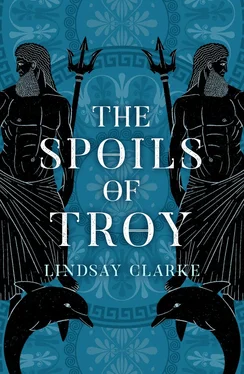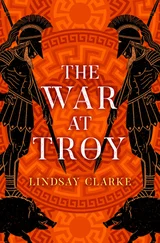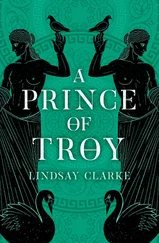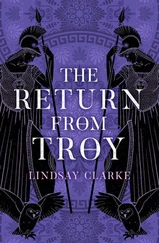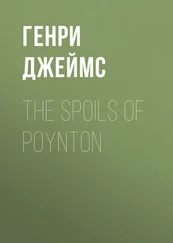All his care and craft and guile counted for nothing now. His brain was in flames with the knowledge. If Agamemnon had been standing beside him in that moment Odysseus might have struck him down. But it was another figure that came hurrying towards him out of the night, a huge Ethiopian, one of Memnon’s men, half-naked, his black skin glistening with sweat, his eyes wide and very white. Reflexively Odysseus drew his sword and stuck him through the belly.
The shock of the man’s weight jarred at his arm, driving the sword deeper. The Ethiopian hung there for a moment impaled, grunting with dismay. Odysseus pulled out the blade and stood back, watching him sag to his knees and fall, shuddering, to the ground. He could hear the black man muttering something in his own tongue – a curse, a gasp of execration, a prayer to whatever gods he served, who knew what those mumblings meant?
Odysseus stared down at the dying man, resentful that he had been drawn into the killing. Then his mind swirled in a blur of rage. If Agamemnon wanted blood, then blood he should have. He advanced across the square towards the sounds of slaughter and once he had begun to kill it seemed there was no stopping. He saw frightened faces gasp and cry as they fell beneath his sword. He saw the wounds splash open. He was killing people swiftly, without compunction, as though doing them a service. At one point he slipped on the entrails of a fat man he had butchered and found himself lying beside him, face to face, with the sightless, outraged eyes staring back into his own. Then he pushed himself to his feet again, driven on by an impulse of disgust, filled with fury and self-loathing.
Almost as deep in delirium as Ajax in his madness had once slaughtered the cattle in their pens, imagining them to be his enemies, Odysseus killed and killed again, working his way through the throng as though convinced that each body that fell before him might prove to be the last, so that he could be liberated, once and for all, from this dreadful duty. His mind was numb. His arm ached from the effort. His throat was parched. It all seemed to be happening in silence.
A Visitor To Ithaca Contents Cover Title Page THE SPOILS OF TROY Lindsay Clarke Copyright Dedication Map The Justice of the Gods The Fall A Visitor to Ithaca The Division of the Spoils The Strength of Poseidon An Audience with the Queen The Last of Troy The Ghosts of Mycenae The Bitch’s Tomb Cassandra Death in the Lion House Anxiety on Ithaca Glossary of characters Acknowledgements Also by Lindsay Clarke About the Publisher
So loud was the anguish at the fall of Troy you might have thought the noise must carry across the whole astounded world; yet it would be weeks before the news of Agamemnon’s victory reached as far as Ithaca. Of all the kingdoms that sent ships to the war, our western islands were furthest from the conflict. We were always last to receive word of how our forces were faring and by the time reports arrived they were far out of date, never at first hand and, more often than not, coloured by rumour and speculation. To make matters worse, Troy was taken late in the year when all the seas were running high and the straits impassable, so the fighting was over long before we got to know of it.
The view must always have been clearer from the high crag at Mycenae but even the intelligence that reached Queen Clytaemnestra was not always reliable, and she was too busy managing Agamemnon’s kingdom in his absence to keep my Lady Penelope apprised of events on the eastern seaboard of the Aegean. Meanwhile the infrequent letters Penelope received from her father, Lord Icarius of Sparta, were always terse in their account of a son-in-law of whom he had never approved. So throughout the war we Ithacans were fed on scraps of information that had been picked up in larger ports by traders who came to the island, or that reached us from the occasional deserter who made it back to mainland Argos. Such men had only a fragmentary picture of events, and who could say whether their accounts were trustworthy? All we knew for certain was that Lord Odysseus had still been alive the last time anyone had news of him.
As Prince Telemachus emerged from infancy into the proud knowledge that the father of whom he lacked all memory was one of the great Argive generals, this proved to be an increasingly frustrating state of affairs. So as his friend, I Phemius – still only a boy myself – did what I could to supply his need with flights of my own fanciful imagination. Each day he and I, along with a ragged troupe of fatherless urchins, fought our own version of the Trojan War around the pastures and coves of Ithaca. From hill to hill we launched raids on each other’s flocks, singing songs and taking blows. Meanwhile, far away in windy Phrygia, Odysseus used all his guile to steer his comrades towards victory over a foe that had proved tougher and more resilient than anyone but he had anticipated.
Then, in the ninth year of the war we learned that an inconclusive campaign in Mysia had ended with the Argive fleet being blown back to Aulis by a great storm. For a time we lived in the excited hope that Odysseus might seize the chance to visit the wife and child he had left so many years before, but all that came was a long letter which was delivered under seal directly into the hands of Penelope.
The next day she summoned my mother and some of the other women into her presence and with the gentle grace that always distinguished her care for our people, she told them that The Raven , the ship in which my father Terpis had sailed from Mysia, had failed to appear at Aulis. There remained a small chance that the crew might have made landfall on one or other of the islands scattered across the Aegean but the women should prepare themselves for the possibility that their husbands were drowned at sea and would not return.
The island rang loud with wailing that day. For me, for a time, it was as though a black gash had been torn in the fabric of things. But remembering how my father, the bard of Ithaca, had sung at the naming day of Prince Telemachus, I converted my fear and grief into a solemn vow that, if he did not return, I would honour his memory by becoming the island’s bard myself.
Meanwhile Penelope gave her son as sanguine an account of the letter as she could. How else was she to speak to a ten year old who knew nothing of his father except her love for him and the fact that almost all those he had left behind on the island spoke of him with affection and respect?
Only many years later, long after the war was won and Odysseus still had not returned to Ithaca, was Telemachus allowed to read the letter for himself. He told me that it contained warm expressions both of undying love and of agonized regret that a hard fate had kept him so long from his wife and son. But it was also filled with bitter criticism of the way the war was being fought. In particular, Odysseus was at pains to distance himself from the decision that had just been taken to sacrifice Agamemnon’s daughter Iphigenaia on the altar of Artemis in order to secure a fair wind back to Troy.
He attributed the blame for that atrocity to Palamedes, the Prince of Euboea, a man for whom he cherished an abiding hatred. It was Palamedes who had demanded that Odysseus take the terrible oath that had been sworn at Sparta to protect the winner of Helen’s hand from the jealousy of his rivals – an oath which Odysseus (who was not a contender for Helen’s hand) had himself devised. It had been Palamedes who accompanied Menelaus to Ithaca and compromised Odysseus into joining the war against his will. Now it was Palamedes who had thought up the scheme to lure Iphigenaia to her death in Aulis with the pretence that she was to be married to Achilles, and Odysseus could no longer contain his contempt and loathing for the man’s devious mind.
Читать дальше
